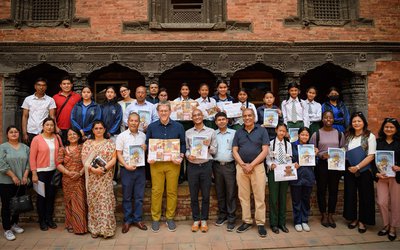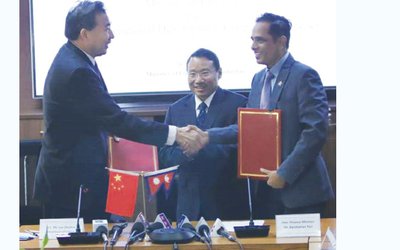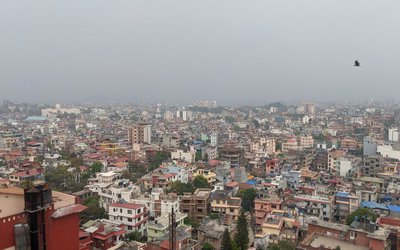Between the time the CPN-Maoists started their armed struggle on 1 February 1996, and the signing of the Comprehensive Peace Accord on 21 November 2006, almost 17000 Nepalis lost their lives while hundreds were caused to disappear by both the state security forces as well as the Maoists. During this time, the conflicting parties were involved in numerous acts of gross human rights violations and breaking of international humanatirian laws, like arresting people extra judicially and disappearing them, physically and mentally torturing people, abducting people on various reasons, capturing their property, displacing entire villages, destroying public and private property, and collecting forced donations.
After the Nepal government and the CPN-Maoists signed the CPA, the country is in a transition phase. Although the state has stopped acts of causing people to be disappeared, organized and armed groups are still indulging in abductions and murders.
Definition of Enforced Disappearances of People
The Declaration on the Protection of All Persons from Enforced Disappearance by the United Nations in 1992, states “enforced disappearances occur, in the sense that persons are arrested, detained or abducted against their will or otherwise deprived of their liberty by officials of different branches or levels of Government, or by organized groups or private individuals acting on behalf of, or with the support, direct or indirect, consent or acquiescence of the Government, followed by a refusal to disclose the fate or whereabouts of the persons concerned or a refusal to acknowledge the deprivation of their liberty, which places such persons outside the protection of the law.”
To protect the people from acts of enforced disappearances and stop such acts Article 2 of the International Convention for the Protection of All Persons from Enforced Disappearance defines enforced disappearances as: “enforced disappearance is considered to be the arrest, detention, abduction or any other form of deprivation of liberty by agents of the State or by persons or groups of persons acting with the authorization, support or acquiescence of the State, followed by a refusal to acknowledge the deprivation of liberty or by concealment of the fate or whereabouts of the disappeared person, which place such a person outside the protection of the law.”
}Defining the phrase “to cause people to be forcefully disappeared” more specifically means a state where a representative of the state arrests an individual and places him/her under judicial custody, but does not give any information about the arrest to the individuals family or community. When arresting the state agents come in plain clothes or even if they come in uniform, do not accept that they have arrested the individual. In such cases those arrested are not given an arrest warrant, and if they are issued arrest warrants, the documents are kept with the person who arrested them or are not made available to anyone else.
If any organized group, or non-state actor, takes and hides another person, for their organizational or individual goals, without the assistance of the state, this is called abduction. A person who is disappeared is not allowed to be met by any family member or for that matter any legal professional and is kept in a separate secret location away from other prisoners.
Main provisions in the Enforced Disapperance Act -2066 (Crime and Punishment)
Nepal has not officially ratified or accepted the UN Convention -2006 to stop acts of forcefully disappearing individuals. However Nepal’s national laws, and those international provisions related to human rights, compel Nepal to ensure that laws are made and implemented to prevent acts of enforced disappearances by the state. Nepal’s Interim Constitution 2063 and the Comprehensive Peace Accord both have emphasized on this. Both documents are committed to forming a high level investigation commission to find out the truth about disappeared people. Most of the provisions in this bill made accordingly are therefore in line with human rights norms, philosophy and code of conducts.
Article 2: Definition: includes the state agencies, organizations, or unorganized groups
Article 3: The act of causing disappearances has been accepted as a criminal offence
Article 4 & 5: Main perpetrator and perpetrators are defined
Article 6: Provisions have been made for the main perpetrator to be fined upto Rs 500,000 and a jail term of upto 7 years. Co-conspirers have been given half the punishment while those who commit the crime on women and children have been given an extra two years double the jail term.
Article 8: Provisions have been made to take necessary compensations from those involved in the crime
Article 10: The Bill has defined the time limit 1 February 1996 to 21 November 2006. Provisions have been made to have five members in the independent high-level commission. The recommendation committee will include the Chair of the House, the Chair of the National Human Rights Commission, and one individual nominated by the Nepal Government.
Article 13: The Nepal Government will provide the officers necessary for the Commission.
Article 15 & 16: The Commissions task, responsibilities and authority will be to investigate the individuals disappeared, determine the perpetrators, recommend for rehabilitation and even investigate decisions made by the court.
Article 17: The Commission shall have the authority like the court to call persons for questioning, to take testimonials, to take into protection all material proofs.
Article 19: Provisions for the protection of the victims and witnesses
Article 20: Provisions to ensure secrecy of the Commissions work
Article 22: Recommendation for the rehabilitation of the victims
Article 23: Recommendation for action
Article 25: Investigation from the Attorny General’s office about registering cases
Article 26: a maximum time limit of 6 months
Article 28: Accused will bear the burden of proof
Article 33: The Commission may use the recommendations given by other agencies when reaching decisions
Article 34: Provisions for punishment to those giving wrong complaints
Notes on the Act and Suggestions
It will be better to put, “As forcefully disappearing people is against humanity and human norms and values, it is integral that laws be made that allow investigations to be conducted on disappeared persons and and those individuals involved in the act of causing individuals to be disappeared, find the truth, punish the guilty, and provide for the rehabilitation of the victims” in the preamble.
The name of the Act should be Enforced Disappearance of People (Crime and Punishment) Act
The following needs to be added in the definitions:
Refusing to accept responsibility or lieing about facts related to arrests made, jailed, or taken into custody, or abducted
Putting individuals beyond legal protection after arresting them
Acts of causing persons or groups to be disappeared using the state’s authority, support or agreement
Any act of taking any senior citizen, women, physically challenged, or children, with wrong intentions, and without the agreement of their guardians or caretakers, or without informing the school, childrens welfare centres, or public spaces or any other place and taking them to a solitary place, going out of contact, shall be considered an act of enforced disappearance
Instead of Article 3 (1) it will be better to have “No person should be forcefully disappeared, or ordered to cause enforced disappearance, or assist in such acts or order to assist in such acts.”
In Article 6 that states a minimum of 7 years imprisonment, provisions for the time of punishment should be increased and compensations arranged for the victims as per the condition of the incident, the state of the victims family and their economic status.
Those proven guilty of indulging in the act of enforced disappearances, if in any government post, should besides being given the mentioned punishment should also be removed from duty.
With regards to the provisions regardin compensation, the victims should receive free legal counseling with the state providing all the assistance necessary for the legal procedure. It should be mentioned that every victim of enforced disappearance should get compensation from the state.
It should be ensured that there be at least one representative from the civil society to ensure that the commission is independent, autonomous, and inclusive (Article 10). The recommendation committee should also have one representative from the civil society to make it more independent. It will also be better to say that cases of enforced disappearances that occurred from 1 February 1996 to 21 November 2006, as well as those incidents of enforced disappearance that have occurred after this period, by adding a sub section. A minmum qualification criteria should be mentioned for officials appointed to the commission.
There should be provisions for the commission to appoint necessary staff by itself, so that it is independent and capable. (Article 13)
Other issues to be amended:
The decision made by the Supreme Court on 28 May 2007 regarding enforced disappearances and the international codes of conduct regarding this should also be addressed in the proposed Act.
Because cases of enforced disappearances and abductions keep occuring during times of armed conflict and unstable political atmosphere, to ensure that such acts do not occur in the future, keeping mind the probability that they might happen, both kinds of incidents should be included in the act.
It should be clearly mentioned that under no excuse should persons be caused to disappear during any period of war, armed struggle, or emergency.
The Act should mention that mass and procedural cases of enforced disappearances is a gross violation of human rights and an act against humanity.
It will be appropriate to mention that during the investigation the Commission should be allowed to hold as many public hearing as is necessary
The next of kin or the legal counselor of persons disappeared should have the right to be fully informed about the person.
The Act should clearly mention provisions for the state to ensure the finding of disappeared persons, to point out the place, free them, or if they have already died to exhume their body, test it, identify it, and to ensure that the deceased’s family gets the remains as well as conduct the funeral as per their custom and culture.
It should be mentioned that those accused under this act should be placed under state jurisdiction on the basis of available proof, until the case is decided by the court and due legal process is taken.
Provisions should be included to relieve any persons holding official governmet positions, if found involved in the act of enforced disappearance, and conduct further action, during the investigation
It will be better to provide for any legal technical issues that might arise during the establishment of the Truth and Reconciliation Commission and the Commission for Disappeared People and the National Human Rights Commisison, which is a constitutional body. Solutions to resolve such technical issues should be included the amendment bill and it should be clearly mentioned that these agencies shall work in cooperation and coordination with one another.
It should be ensured that every victim in cases of enforced disappearance shall have the right to know the true facts, as is the right to information.
Provisions should be arranged for the Commission to o send proofs to the National Forensic Laboratory and keep take the opinion of national and international experts to scientifically prove some facts if necessary.
The Act should also mention that if a body needs to be exhumed the security of the area is everyone’s responsibility.
This study was conducted by human rights expert Dr. Yagya Adhikari for the Nepal Constitution Foundation, and written on the basis of suggestions from women, indigenous peoples communities, Dalit, Madhesi, Youth and other pressure groups. The foundation is greatful to Bijaya Mishra, Manchala Jha Meena Swarnakar, Reshma Thapa, Niru Shrestha, Dr. Bhimarjun Acharya, Anita Joshi, Furpa Tamang, Sushma Chaudhari, Krishna Angdambe, Shyam Kumar Bishwokarma, Umesh Prasad Sha, Kopila Rijal, Abhishek Adhikari, Subash Acharya, Dr. Harihar Osti, Dr. Surya Dhungel and Dr. Bipin Adhikari
This research has been supported by the Asia Foundtion.Views and opinion Exprssed in this report are of the authors and don’t necessarily reflects of The Asia Foundation.
- TANAHU HYDROPOWER PROEJCT: A Significant Achievement
- Apr 15, 2024
- AMBASSADOR HANAN GODAR: Sharing Pain With A Nepali Family
- Mar 30, 2024
- VISIT OF KfW AND EIB TO NEPAL : Mission Matters
- Mar 25, 2024
- NEPAL BRITAIN SOCIETY: Pratima Pande's Leadership
- Mar 24, 2024
- NEPAL ARMY DAY: Time To Recall Glory
- Mar 15, 2024
















